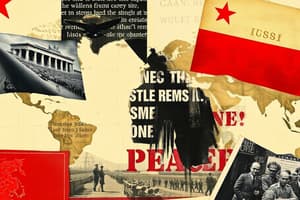Podcast
Questions and Answers
What were the major consequences of the collapse of the USSR and its aftermath?
What were the major consequences of the collapse of the USSR and its aftermath?
The major consequences of the collapse of the USSR and its aftermath include the end of the Cold War, the emergence of the United States as the sole superpower, the spread of democracy in Eastern Europe, the dissolution of the Soviet Union into independent states, and the economic and social challenges faced by these newly independent countries.
How did the collapse of the USSR contribute to the unipolarity of the United States?
How did the collapse of the USSR contribute to the unipolarity of the United States?
The collapse of the USSR removed the main rival of the United States, leaving it as the sole superpower in the world. With no other major power to challenge its dominance, the United States became the unipolar power.
What were some major international trends and events in the post-Cold War era in Europe, Asia, the Global South, and the Middle East?
What were some major international trends and events in the post-Cold War era in Europe, Asia, the Global South, and the Middle East?
Some major international trends and events in the post-Cold War era include the expansion of the European Union, the rise of China as an economic and military power, the spread of globalization, the increasing influence of non-state actors, the growth of regional conflicts and terrorism, and the challenges of development and poverty in the Global South.
What were the major political and economic changes that occurred in Europe following the collapse of the USSR?
What were the major political and economic changes that occurred in Europe following the collapse of the USSR?
How did the post-Cold War era contribute to the rise of China as a major global power?
How did the post-Cold War era contribute to the rise of China as a major global power?
What were some of the major conflicts and geopolitical shifts that occurred in the Middle East after the end of the Cold War?
What were some of the major conflicts and geopolitical shifts that occurred in the Middle East after the end of the Cold War?
What were the main factors that led to the collapse of the USSR and what were the consequences of this collapse?
What were the main factors that led to the collapse of the USSR and what were the consequences of this collapse?
How did the collapse of the USSR affect the balance of power in the international system?
How did the collapse of the USSR affect the balance of power in the international system?
What were some of the major international trends and events in Europe, Asia, the Global South, and the Middle East after the end of the Cold War?
What were some of the major international trends and events in Europe, Asia, the Global South, and the Middle East after the end of the Cold War?
Flashcards are hidden until you start studying




